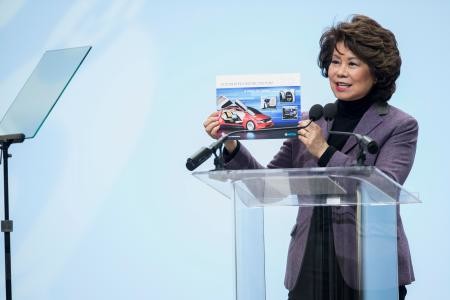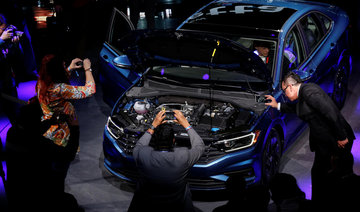DETROIT: The Detroit auto show arrived Sunday with showman’s flair, as the car industry tied its latest offerings to American nostalgia and Hollywood glamor.
But on the sidelines, there were lingering questions about policy and politics.
Arnold Schwarzenegger emerged from a Mercedes-Benz G-Class SUV. The granddaughter of screen legend Steve McQueen arrived in the latest version of the Ford Mustang he immortalized on film.
In a keynote address, US Transportation Secretary Elaine Chao touted just-enacted US tax cuts, which reduced the US corporate tax rate from 35 to 21 percent, saying the move will attract more US investment.
There were also cautious statements about ongoing renegotiations of the North American Free Trade Agreement, on which the North American car industry heavily relies.
But the auto show is about the cars, and automakers did their best to stay focused on their products.
With Americans’ appetite for trucks and SUVs expected to remain robust in 2018, brands highlighted a number of new offerings in that category.
Mercedes-Benz debuted a redesigned G-Class SUV, significantly updating the interior with new technologies. The vehicles were made to climb steep ramps as flames shot up from the ground and confetti cannons blasted. As one finally stopped, Schwarzenegger emerged from a passenger seat.
“I have driven G-Wagens now for 25 years,” glowed the actor of Austrian heritage.
“I think this car became so historic,” he said, “because of its look.”
Ford unveiled its own nostalgic offering, showing off a new mid-sized Ranger pickup, redesigned and reintroduced to the North American market.
It also offered a new sports trim of its Edge SUV, as well a third iteration of a “Bullitt” special edition of its Mustang sports car.
Actor McQueen drove a 1968 Mustang in the thriller film “Bullitt,” creating an indelible link between the car and American pop culture. His granddaughter Molly McQueen emerged from the latest special edition, comparing it favorably with the original.
“It is fun. It’s fast and effortlessly cool,” she said.
In a break from most of the big launches, Volkswagen highlighted a sedan, releasing its updated version of the Jetta, the German automaker’s top-selling vehicle in the US.
The base price of $18,545 won especially loud applause at a glitzy launch, and was a counterpoint to the pricey SUVs and trucks that can easily cost twice that amount and more.
“As a full-line automaker... you need to have a competitive, strong sedan,” VW North American chief executive Hinrich Woebcken told reporters after the launch.
On the sidelines of the flashy announcements, industry insiders were taking a wait-and-see attitude toward talks to revamp the North American Free Trade Agreement, which has generated fears of huge tariffs on Mexican-made imports to the US.
Negotiations have been ongoing for months at the insistence of US President Donald Trump, who has threatened to abandon the agreement if a beneficial deal is not struck.
“There’s good conversation going on to modernize NAFTA,” said Mary Barra, CEO of General Motors. “We’re going to continue to interact constructively to make sure people understand the very complex nature of our business.”
Ray Tanguay, automotive adviser to the Canadian government, highlighted his country’s close ties to the Michigan car industry, and cautioned that losing NAFTA could cost American car buyers higher prices.
“The integration is so much that if you try to break that, you’re going to hurt the consumer,” he said.
Analysts were less certain about potential impacts.
“There continues to be the debate — ‘Is the president using hyperbole to get something less severe because he’s a skilled negotiator, or does he seriously think that we need to be exiting NAFTA,’” said Cox Automotive economist Jonathan Smoke.
Meanwhile, the effects of the recently enacted $1.5 trillion in tax cuts were expected to be varied by region and income level. Among the clearest winners will be luxury vehicles because of the tax bill’s bounty to those with incomes over $150,000 a year, said Smoke.
Highlighting the tax changes, which reduced corporate rates, Chao pointed to Fiat Chrysler’s decision to move production of its Ram trucks from Mexico to an assembly plant near Detroit. The car maker said it would invest $1 billion and add 2,500 jobs.
“This is just one example of the positive impact that the tax cuts and jobs act will have on workers, job creators, employers and our country,” Chao said.
But analysts said many households still don’t have a clear sense of how much they will benefit from the complex changes to tax laws.
“There’s some people that are probably putting off purchases because they don’t really know... what our paychecks are going to look like,” industry analyst Rebecca Lindland of Kelley Blue Book said.
Amid tax and trade concerns, Detroit auto show offers nostalgia, glamor
Amid tax and trade concerns, Detroit auto show offers nostalgia, glamor

How lifestyle-led real estate is reshaping Saudi Arabia’s urban future

- Government spending, regulatory changes, and incentives for foreign investors are fueling development
RIYADH: Saudi Arabia’s real estate sector is entering a new phase, one defined by lifestyle, experience, and quality of life rather than sheer housing volume.
Driven by Vision 2030, lifestyle-focused developments are set to outperform traditional residential projects, reshaping how people live, work, and connect across the Kingdom.
Government spending, regulatory changes, and incentives for foreign investors are also fueling development. Rising demand across residential, commercial, and logistics sectors, along with the push for smart cities and sustainability, is reshaping the market.
Saudi Arabia’s real estate market was valued at $77.2 billion in 2025 and is projected to grow to $137.8 billion by 2034, with a compound annual growth rate of 6.7 percent from 2026 to 2034, according to IMARC Group.
Lifestyle-focused real estate market
Saudi Arabia’s real estate landscape has evolved beyond conventional housing. Guided by Vision 2030, it now plays a key role in enhancing quality of life, boosting tourism, and driving economic diversification.
According to Sally Menassa, partner at Arthur D. Little, what stands out today is a clear shift from volume-driven residential supply to lifestyle-led, experience-based development.
“As a result, the lifestyle-focused segment is expected to outperform conventional residential real estate, growing at around 8 percent annually over the next five years. This growth is being driven by changing consumer expectations, population growth, rising incomes, and the scale of public investment shaping new urban environments,” Menassa said.
She added that demand in the Kingdom’s real estate is rising across four key segments: mixed-use districts near urban hubs such as King Salman Park; wellness-focused communities prioritizing walkability and services; coastal living along the Red Sea with branded residences; and heritage-driven districts like Diriyah and Al Balad that blend culture, hospitality, and long-term value.
“Overall, this marks a fundamental shift in the Kingdom. Real estate is no longer an end in itself and about delivering buildings; it is becoming a platform for place-making, economic diversification, and sustained value creation,” the ADL partner explained.
From another perspective, Houssem Jemili, senior partner at Bain and Co. Middle East said: “Saudi’s real estate market is forecast at roughly 7–8 percent CAGR to 2030; ‘lifestyle’ demand is being pulled most by amenity-led mixed-use communities plus higher-spec, greener and wellness-leaning homes.”
A report from PwC Middle East released in 2025 focused on the future of sustainable real estate in Saudi Arabia, and showed that the sector is shifting toward livability-focused, high-quality urban developments. Giga-projects are driving demand for mixed-use, wellness-focused, and socially connected communities that enhance quality of life.
Imad Shahrouri, cities sector lead partner, consulting, in Riyadh at PwC Middle East said: “By placing livability and human experience at the foundation of its urban agenda, Saudi Arabia is shaping a market where lifestyle-led developments will play an increasingly influential role in driving demand and investment.”
Core lifestyle elements developers are prioritizing
Saudi developers are shifting from the traditional “build and sell” model to creating integrated lifestyle communities focused on long-term value and everyday living.
Menassa from ADL highlighted that the shift centers on enhancing public spaces — with walkable areas, parks, and wellness facilities — to promote healthier, more social lifestyles, especially for a younger, health-focused population.
“Convenience is also playing a bigger role in shaping residential districts. Schools, childcare centers, clinics, co-working spaces and a wide range of food and beverage options are increasingly located within walking distance of homes, reducing commuting time and making everyday life more efficient and connected,” she said.
The partner added: “Equally important is the role of culture and social activity. Many developments now incorporate cultural venues, entertainment spaces and destination dining, ensuring that neighborhoods remain active throughout the day and week rather than becoming dormant outside working hours.”
Menassa went on to stress that real estate in Saudi Arabia is evolving into a strategic tool for quality of life, tourism, and talent attraction. Driven by Vision 2030, developments now integrate smart infrastructure and global lifestyle standards, while staying rooted in local culture to meet the needs of a young, urban population.
From Bain’s lens, Jemili said: “Developers are prioritizing livable neighborhoods. Walkability, parks and sport, culture and entertainment access, and everyday convenience, shaped by Vision 2030’s Quality of Life agenda and the 70 percent homeownership-by-2030 push.”
Shahrouri from PwC shed light on how developers in the Kingdom prioritizing livability, wellbeing, and inclusive, community-focused spaces are, aligning with Vision 2030’s push to enhance daily life and promote social integration while reflecting local identity.
“As a result, lifestyle-led elements such as walkable neighborhoods, activated public spaces and integrated community facilities are becoming central to new destinations, ensuring future developments foster more connected, resilient and experience-rich ways of living,” he said.
Regions, cities key hubs for experiential development
Several Saudi cities are emerging as prominent centers for lifestyle-focused, experiential development, each defined by its unique urban and economic character.
From ADL’s perspective, Riyadh is leading this shift as it positions itself as a global capital. The city is seeing strong demand for integrated, mixed-use districts that support live-work-play lifestyles.
“Developments such as KAFD, Diriyah, and areas surrounding King Salman Park reflect a growing preference for urban living that combines employment, culture, green space, and entertainment in close proximity,” Menassa said.
“Jeddah’s appeal is different, but equally compelling. Its strength lies in its coastal character, historic fabric, and more relaxed urban rhythm. Waterfront regeneration and heritage-led districts, particularly around Al Balad, are driving interest in developments that blend walkability, culture, and sea-facing lifestyles — attracting residents, investors, and tourists alike,” she added.
The partner continued to underline that destination developments along the Red Sea coast focus on sustainable, low-density communities blending hospitality, nature, and residential living, promoting wellness and eco-tourism.
Menassa noted that secondary cities like Abha and AlUla are emerging as hubs for outdoor living, culture, and heritage, supported by government policies and investments.
These lifestyle-driven districts appeal to residents for livability and job access, and to investors for scale and stability, offering resilience through everyday services and cultural experiences.
From Bain’s side, Jemili explained that Riyadh and Jeddah stand out as the main hubs because they combine jobs, population growth, liquidity and are where “integrated community” formats scale fastest.
“We’re seeing the same in Makkah and Madinah; the focus is shifting from delivering more units to delivering higher-quality development and standards,” he said.
From PwC’s perspective, Shahrouri noted that regions across Saudi Arabia are becoming hubs for lifestyle-driven development, with large-scale regeneration creating sustainable, well-designed environments that enhance urban living and attract global investment.
“Flagship projects are reshaping their surroundings by focusing on the character and feel of place, bringing together community elements, environmental responsibility, and integrated urban design.”
Their growing appeal comes from the balance they strike between modern infrastructure and a human-centered approach to planning, creating destinations where daily life feels more seamless and connected,” he said.
Next phase of Saudi real estate evolution
The next phase of Saudi Arabia’s real estate evolution is likely to be defined by integration, intelligence, and regeneration.
From ADL’s lens, Menassa explained that Riyadh is set to feature highly vertical, dense urban environments designed for land efficiency and sustainability, with fully integrated live-work-play ecosystems that reduce commuting, boost productivity, and enhance social cohesion.
“The real shift, however, is toward AI-enabled and data-driven communities, where energy, mobility, and services are actively managed rather than passively consumed. Real estate will increasingly be judged not by how much is sold, but by how well places perform — in terms of livability, productivity, and environmental outcomes,” she said.
The partner noted that Saudi Arabia is boosting private sector involvement, public-private partnerships, and institutional investments to develop public spaces and social infrastructure. The focus is shifting from just constructing cities to designing lifestyles, using real estate as a key driver for economic growth and social transformation.
Jemili from Bain said: “The next phase is more about operating districts like platforms, digital twins, and real-time data to optimize energy, maintenance, mobility, and resident experience, creating tighter live-work-play loops. Rather than ‘building more.’”
From PwC’s side, Saudi Arabia is building a strong foundation for future cities by focusing on resilient, resource-efficient developments and adaptable infrastructure, paving the way for smart, connected urban models like vertical districts and digital neighborhoods.
“These emerging environments are set to respond more naturally to the needs of their communities. As the quality and experience of urban life continue to rise, our cities are poised to become more intelligent, enriching and future ready, evolving with their residents and reflecting the ambition of a nation transforming at pace,” Shahrouri concluded.














